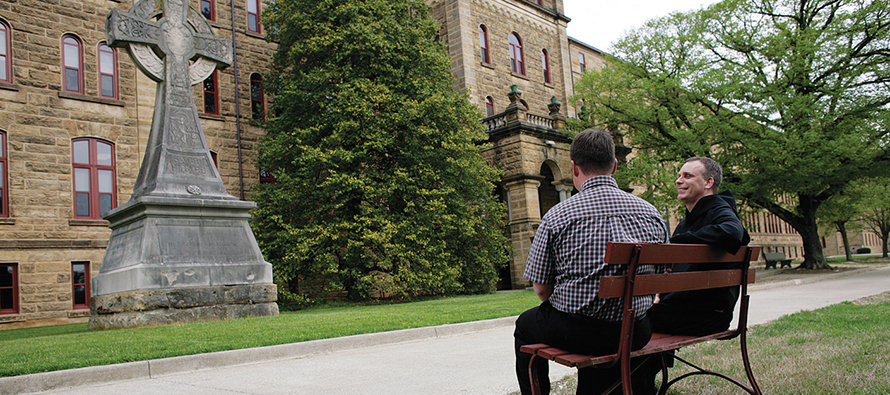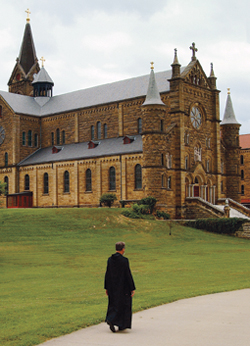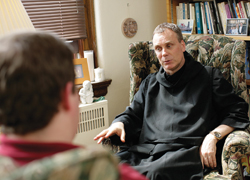Ten things to know about discerning a vocation

Image: “Awareness of our personal gifts and weaknesses can help us considerably in gaining a sense of which vocations are possible for us.” Father Subprior Guerric DeBona, O.S.B. talks to a visitor outside the abbey church of the Benedictine Archabbey of Saint Meinrad.
ON JANUARY 25, 2008 I made solemn vows as a Benedictine monk of Saint Meinrad Archabbey. Eighteen months later, on June 7, 2009, I was ordained a priest by Archbishop Daniel Buechlein, O.S.B. of the Archdiocese of Indianapolis. These two events were, for me, not only the celebrated beginning of a new level of committed service to God and church; they marked the end of a long and sometimes difficult path of discernment.
| “Before we can be an apostle, ‘one who is sent,’ we must first be a disciple, ‘one who follows.’ ” |
Joyfully and gratefully I reflect upon the fact that the many hard years of going back and forth over whether I should give priesthood and religious life a try, or make a commitment to them, are over. Nonetheless, my heart goes out to those who are still in the throes of vocation discernment. I know that it can be one of the hardest tasks someone undertakes in life. The following are 10 pieces of wisdom I picked up during my own discernment journey. Most of these were communicated to me, in some way, by mentors, teachers, friends, and family members. They do not constitute a formula for discernment. Nonetheless, they did help me get from point A to point B.
1. God calls
At the heart of the “American Dream” is the idea that one can be anything one wants to be. The glory of living in a free nation is that we have the opportunity to make of ourselves what we will. Alas, we are taught from a young age that it is important to be true to our dreams and, accordingly, plot a course for our lives. All that isn’t unimportant. The problem though, for a person of faith, is that it can potentially leave God out of the decision-making process.
Vocation comes from the Latin word, vocare, “to call.” It is a calling, a calling from God, who made us, loves us, and has a plan for us. Discernment, then, is different from simply making a decision about a career path or lifestyle. Discernment starts in faith, where we acknowledge God as the source of vocation, involve God in the decision-making process through prayer, and actively listen for God’s will.
2. Vocation is a two-way gift
God really does want us to be happy. When it comes to a vocation we sometimes struggle to believe that. Perhaps we fear that God will ask us to do something we will hate. Maybe we think God’s will is a sentence to a dreadful life. On the contrary, in John’s gospel Christ says: “I came that they may have life, and have it abundantly” (John 10:10).
But what will make us really happy? The Second Vatican Council teaches that it is through self-giving that we are fulfilled as human beings. So vocation is not only something given to us, something we receive, it is also something we freely give to God and others.
3. God preserves our freedom
Because vocation is something we give to God, it is important that we have the freedom to make this offering. God gives us real choices. We have the freedom to marry or enter religious life or remain single. We have the freedom to pursue this or that line of work. If we are not in a place in life where we are free to commit to a vocation (perhaps due to an immaturity, an undue fear, or an addiction), then we must increase in our freedom before we can make a vocational choice. God, rest assured, helps us in this process.
Furthermore, as long as we are not choosing something evil, God respects the choices we make. We must not believe, as so many in discernment do, that God will reject us if we make the “wrong” choice. On the one hand God really does call us to vocations. On the other God respects our freedom and does not abandon us.
4. Know thyself
A key insight shared by many saints is that spiritual growth begins in self-knowledge.
God, who will sanctify us through our vocation, has already endowed us with a certain nature. Ordinarily the grace of our vocation will build upon this nature. An awareness of our personal gifts and weaknesses can help us considerably in gaining a sense of which vocations are possible for us and which are probably not wise paths for us to take.
Along these lines it is also important to listen to our hearts, to be attentive to those relationships and activities that give us the most peace and joy. In addition, our dreams and desires are significant. These may even be the promptings of the Holy Spirit showing us ways to creatively respond to God’s call.
5. Christ is the way, the truth, and the life
An authentic Christian vocation is always rooted first of all in being a disciple of Jesus Christ. To better know God’s will for our lives and follow it is imperative that we first come to know Jesus Christ and begin to model our lives after his. By encountering the Word of God in scripture, we receive the light that “enlightens everyone” (John 1:9). His life inspires, motivates, and directs ours.
By receiving Christ in the sacraments we receive the grace that will empower us to pursue our vocation. By living according to his precepts, we develop the strength to follow him in bigger things later. By surrounding ourselves with God’s people, the body of Christ, we discover the necessary support to initially try out a vocation and later to commit to it and live it out. Before we can be an apostle, “one who is sent,” we must first be a disciple, “one who follows.”
6. Find your place in the symphony
| “As one progresses along the path of discernment, a spiritual director is often necessary, especially if one is discerning priesthood or religious life.” Father Subprior Guerric DeBona, O.S.B. of the Benedictine Archabbey of Saint Meinrad speaks with a visitor. |
The church is like a symphony. It is one group playing one score but it’s also full of uniqueness. There are lots of different instruments and parts. Personally I think of that score as love, and I think of the different instruments and parts as being the different vocations in the church. Finding our vocation, then, is like finding our instrument in the symphony, our unique way of “playing” God’s love in the world.
It helps in discernment, then, to get as involved with the faith community as you can. It is by taking part in the life of the church and trying out different instruments—at the parish, on mission trips, in Bible studies, in lay apostolate groups—that you will most naturally find your place in the symphony.
7. Ask for help
No one can discern a vocation alone. One’s friends, ministers, family members, and fellow parishioners can be helpful sources of support and insight. These folks can often see things in us that we don’t readily perceive. As one progresses a little bit along the path of discernment, a spiritual director is often necessary, especially if one is discerning priesthood or religious life.
Another source of help is the saints. They are also our brothers and sisters in the church and they are wonderful intercessors on our behalf. A number of saints are designated patrons of particular vocations, so if one is considering that vocation it is a good idea to ask that saint for help. For example, the famous 20th-century monk Thomas Merton explains that he had reached an impasse in his discernment and felt unable to move forward. He turned to the help of Saint Thérèse of Lisieux, who had promised to help young priests, and very quickly after that he obtained the grace to know which religious community he should enter.
8. Expect some “blindness”
I have yet to meet anyone whom God has struck with a lightning bolt and told exactly what to do with his or her life, nor can I say that ever happened to me. But I have learned to appreciate that “blindness” must in some sense be there. That is true because our vocation must be a gift made in faith. If we knew exactly what God wanted or what would make us most happy, there would be no risk, no cost, and, in effect, no love.
9. God writes straight with crooked lines
One man I know told me that as he approached his wedding he was overcome by a sense of unworthiness to marry his wife, much less to be entrusted with the children they hoped to have one day. As I approached my own ordination I felt a similar sense of dread as I became acutely aware of my own sinfulness.
Scripture reminds us, though, that God writes straight with crooked lines. Whatever we have done or whoever we have been in the past, God can still use us. We have only to recall Saints Peter, Paul, and Mary Magdalene to be reminded what God can do with weak human beings!
10. Discernment is not your vocation
Perhaps the most helpful bit of wisdom I received in discernment was the nudging of my spiritual director when he said, “Discernment is not your vocation.” There comes a time in the process of exploring who we are and what we want to do with our lives that we must take a risk and try something. God rewards our efforts, and God can do much more with a mistake than with inertia.
Tags
Related
- Questions Catholics Ask: What are the different forms of prayer?
- What does “success” look like in discernment?
- How to find a guide for your vocation adventure
- Beware of bots and bad actors as you engage online
- Call stories to help you discern
- Five reasons to pray the Liturgy of the Hours
- Tune into your prayer life
- Embody your decisions
- Your mission awaits you! Pope Francis' message to young people
- My portable prayer life Read More
Most Viewed
- Find your spirituality type quiz
- Questions and answers about religious vocations
- Celibacy quiz: Could I be a nun? Could I be a brother? Could I be a priest?
- Resources for older discerners or those with physical and developmental differences
- About Vocation Network and VISION Guide




 Father Christian Raab, O.S.B. is a monk and priest of St. Meinrad Archabbey in St. Meinrad, Indiana. Before entering the monastery he was a high school teacher.
Father Christian Raab, O.S.B. is a monk and priest of St. Meinrad Archabbey in St. Meinrad, Indiana. Before entering the monastery he was a high school teacher.